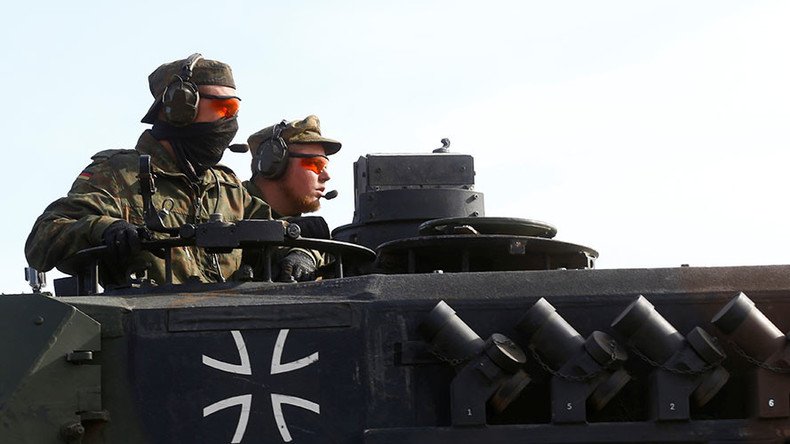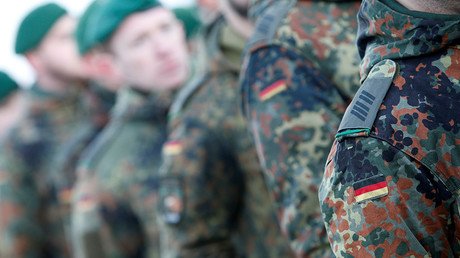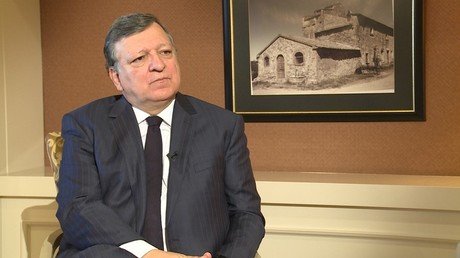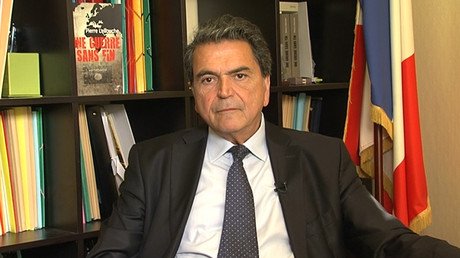Would plans for EU army in Iraq be free security service to Americans?

Brussels is now mulling the idea of running Iraq with a new EU army which would protect US soldiers who remain there after Mosul falls. Someone call Oliver Stone.
There has been much hype of late about the creation of an EU army, with more gusto stirred recently in Brussels, when EU foreign ministers showed support for the blueprint – seen as the answer to breathe new life into an ailing European Union project. It’s still unclear though whether Brussels would lead the new battalion or whether it might be simply run by the EU’s most powerful member state, Germany – which, to complicate matters further, has been moving forward with its own EU army alternative model with partners Romania and the Czech Republic.
Undeterred by a wholesale lack of confidence from more or less everyone, Frederica Mogherini, however, is now putting her weight behind a grandiose plan to provide EU soldiers on a peacekeeping mission to western Iraq, once US soldiers have completed their mission in Mosul.
One has to wonder whether her team of advisers has done their homework though. Sure, the EU ‘peacekeepers’ have come a long way since the days of 2002 where a French brigade ran away from Chad militias on the Egyptian border complaining that they were “being attacked with live rounds.” But has Federica Mogherini completely lost her mind?
Not quite. Reports, via a French diplomat, claim Iraq has requested EU support. In terms of whacky ideas which she has supported though, this one goes off the scale and might be the mission which has catastrophic consequences both for the EU and the European armies who sign up for it – despite NATO also likely to be part of the future mission there.
Who do you think you're kidding, Mrs. Merkel?
The key question is what role Germany would play. From as far back as 2013, it was revealed that not only was Germany’s time in Afghanistan of great importance to Berlin, which has since been moving forward to create their own cheaper rival to a formal Brussels-led EU army.
Germany's ‘mission’ in Afghanistan was quite limited compared to America’s and Britain’s as these two countries were in the south of the country and engaged in front-line fighting. When I was with a German commander in the safety of Kunduz province in 2008, I asked him what his biggest challenge was there. “Getting proper food to my men, which we fly in from Dubai as we can’t trust the locals to poison us,” he replied, spitting into my face with his expletives.
The Germans will be up for the Iraq mission, but they, like the EU, will certainly bite off more than they can chew.
The EU itself is also quite confident now about peacekeeping missions. It has 15 scattered around the world in places as far flung as Mali or the desert of Niger; such is its naked lust to fly an EU flag in war zones and provide the Brussels press pack with ‘hand-out’ PR fodder.
When you examine very carefully what its units of EU soldiers do in these war zones, it’s difficult to accept that their mission is what most would consider being real ‘peacekeeping.' In most cases, the EU missions don’t have any real hardcore role and no mandate to shoot back if attacked.
Worse, in nearly all cases, the EU peacekeepers are hiding behind other more serious peacekeeping organizations and are not exposed to the threats.
Somalia is probably the closest example which could compare to Iraq in terms of danger. It’s also a good example where the EU financially supports African Union (AU) soldiers who do the real peacekeeping, allowing an EU contingent to do the military training of the local incumbent army. It’s an illusion which deceives Western media into thinking it’s the EU which is doing the soldiering and taking fire. Even in Somalia, one of the Western media’s greatest supporters for the EU project admits the setup isn’t winning the war against militias there.
That can’t be the case in western Iraq as, according to reports, the EU doesn’t have a bigger brother there to protect its peacekeepers. The idea – don’t laugh –is that the EU sends in a real peacekeeping mission of armed soldiers after the Americans have packed up and cleared out of Mosul.
The EU hasn’t thought this through. Unlike draft regulations over the size of windscreen wipers on cars, or harmonizing EU directives on the shape of toilet brush holders, Brussels does need to be more serious. This devil is in the detail. Whom do these people want protecting from? They are Sunnis and don’t want Iraq’s majority Shias to come into their roost and take over their towns.
Does the EU want to place itself in such a perilous situation – with Shia militias on one side and Sunnis on the other, given that we are already at the abyss of a bloodbath in the region of those two groups? Let’s not forget the main reason why ISIS took over many of these towns, which was to offer the locals the assurance the Shias would not come in and mess with them. Let’s just go over that one more time.
Millions of Sunnis in Iraq, who welcomed ISIS into their towns to protect them from Shia militias, now no longer have the extremists there and will soon look to the EU to protect them. Yeah.
Can the EU, which has no real experience in peacekeeping, run such a mission, from either German commanders who thought Kunduz was a rough gig up there on the Tajikistan border? Or worse, from a military command in a new shiny office in Brussels? Is somebody having a laugh here?
Putting the cart before the horse?
The gag just gets funnier the longer you examine the local politics and what the Americans are trying to do in this Sunni part of western Iraq, according to a stellar example of investigative journalism by Dr. Nafeez Ahmed of Alternet.
The British academic claims the bigger picture of the Trump administration – or rather the plan of a close circle of Trump’s friends – is to help western Iraq break away from Baghdad and become an independent country and in so doing, reward them with exclusive oil rights. Yes, faster than you can repeat Jim Mattis’ quote “we don’t want to take Iraq’s oil,” it seems, awkwardly that, in fact, that’s exactly what Trump’s cronies are doing.
So the EU role, therefore, is to provide free security services for the American colonial administration of advisers and retired army generals who need to move from government ministries to their hotels? Is the EU about to send its soldiers to essentially protect an American contingent in a new country which they blithely knew nothing about?
There are areas however which the EU could help Iraq, a point raised by Sputnik in a recent article which drew attention to a recent high-level meeting in Brussels where the subject was first raised.
“It is suggested the mission could build up Iraqi counterterrorism forces, establish functioning justice and interior ministries and give strategic security advice to the Iraqi government, as well as train police,” argues the piece.
If the EU follows its usual pattern of working under a big brother – so it can pretend to be soldiering when in fact it is only training – then the Iraq plan might not be so daft. Indeed, NATO is also said to be planning to be part of the apparatus.
But could many European countries that were in the NATO coalition in Afghanistan now be part of its operation in Iraq, when EU armies will be there under their own mandate? If Germany is there, then others, like Romania and the Czech Republic will want to work under it – and probably many other EU countries - so already the power balance is shifting over to the EU side. In fact, in 2008, I found in Brussels that there was a plan for the EU to take much more power in Afghanistan away from NATO.
Given the EU is more committed now to an EU army that Germany wants to lead, and Berlin is confident now more of that role, does it not seem reasonable to assume that Iraq will be where this new plan will be unveiled?
It’s hard to imagine now an EU coalition of peacekeepers working underneath a NATO umbrella. And so, if that is the case, in terms of mind-numbing ambition, the plan is the EU’s most radical as for the first time EU soldiers will not have a big brother to hide behind. In other words, they will have to fight and return fire – entirely new ground, and one which could go horribly wrong for those gunning for a new, beefed up role for Brussels.
Arguably it would mark the first major test of autonomous EU foreign policy in history, as previous jaunts have been far from successful.
A 2006 visit to Iraq to train judges and police, was widely considered a failure. In 2008, I discovered myself that an ‘EUPOL’ mission – made up of European police officers assigned to Afghan police in the capital – failed to function as most officers were too afraid to leave their barracks, such was the security situation in Kabul. The Belgian army contingent in Kabul never actually left their barracks at all. An Italian regiment I was embedded with outside of Kabul made news later for actually paying the Taliban cash each month not to shoot at their soldiers.
If the EU and the Germans are looking at Afghanistan as their blueprint, then they’re really in trouble from the off.
Coupled with the total failure of state building measures, a high number of weapons held by civilians, we are reminded how ISIL was formed in the first place when an adviser to George W. Bush decided in 2003 that half a million Iraqis – many Sunnis – who were in the regular army were not to be paid and were no longer required. The EU soldiers will not be especially welcome in Iraq and might be ripe picking for assassinations or kidnappings. They will be placing themselves in probably the most incendiary, vulnerable area in the Middle East which still has very high numbers of people who support the ideology of ISIS. Let’s hope the Germans are well fed, at least, and the Italians have got suitcases of cash.
Martin Jay is based in Beirut and can be followed at @MartinRJay
The statements, views and opinions expressed in this column are solely those of the author and do not necessarily represent those of RT.
















